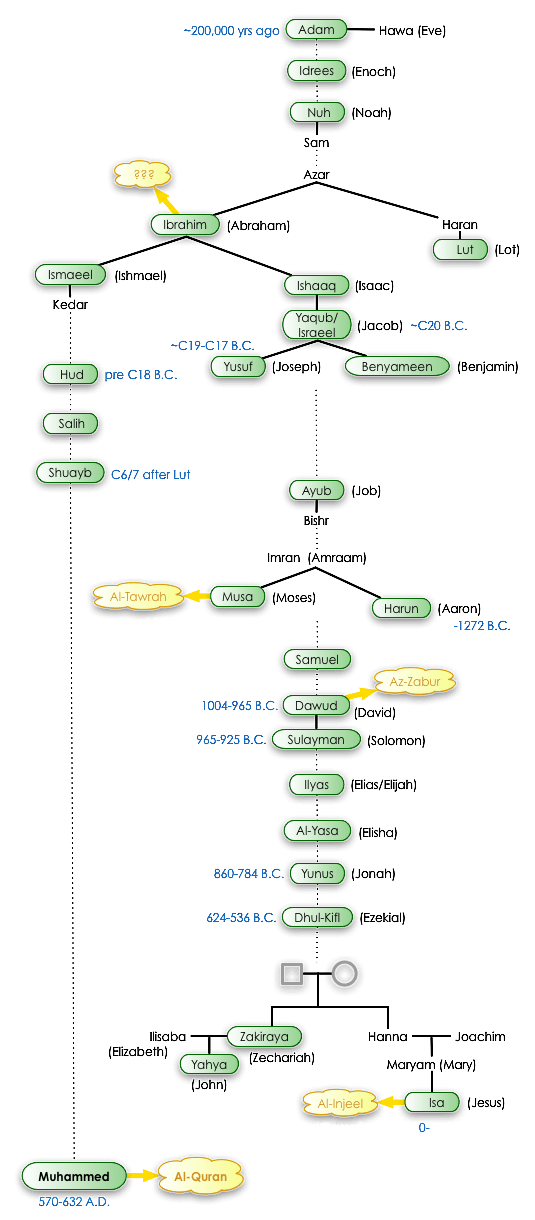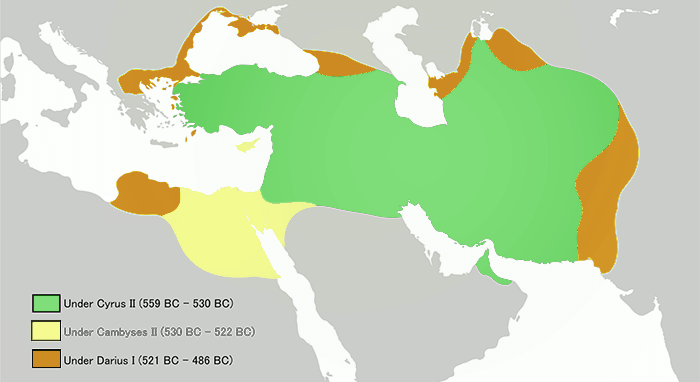Some Of The Other Prophets {pbut} In Islam
As muslims, we believe in the same prophets as the other two Abrahamic faiths.
Here is a 'Tree' of the lineage of the prophet.
Green boxes indicate a prophet. A yellow 'cloud' shows a scripture revealed by that prophet to his people (for instance, Ibrahim {pbuh} revealed a book which we believe has been lost/forgotten by mankind). The blue numbers are approximate dates for the period that those prophets lived. Notice how as muslims, we believe in the same lineage of prophethood as the other two Abrahamic faiths of Judaism and Christianity. There are some differences (such as the fact that Ismaeel {pbuh} was Ibrahim's {pbuh} first born from his second wife Hajr/Hagar and was the son Ibrahim {pbuh} was commanded to sacrifice - Ishaaq is actually the second born son from his first wife Sairah/Sarah - both sons were prophets) but generally speaking all three faiths are in agreement about who was who. A thick line indicates an immediate relative, whereas a dashed line indicates a more distant descendant (obviously, the lines aren't drawn to scale).

We believe that there have been approximately 124,000 prophets in total, of which 313 are mentioned in the Quran. A prophet who has scripture revealed to them and then teaches from this is a messenger. Hence there were only 5 messengers in Islam.
It's also important to realise that we do not believe that these older books (Towrah/Zabur/Injeel) exist today as they did originally. For example, the Injeel is not the modern day Gospel. The Injeel was a revelation sent down by God to Jesus {pbuh} that he preached from. In contrast the modern day Gospel is, according to Christian scholars, a biography of Jesus {pbuh} written by people who were not alive when he was hundreds of years later. In fact the earliest complete Gospel is the Codex Sinaiticus which was written more than 325 years after his time on Earth by random unknown authors (some Christian scholars say up to 32). As you can see these are completely separate texts.
Similarly, the earliest Torah was compiled around 350BC whereas it's supposed author, Moses {pbuh}, was alive one thousand years earlier around 1350BC, so as you can see the Torah bares little resemblance to the original Al-Tawrah we believe Moses {pbuh} had revealed to him.
Dhul-Qarnayn
As well as the Prophets there are also many blessed and noble people mentioned in the Quran too. Take Dhul-Qarnayn for instance, mentioned in the Quran [18:83-101]. He was just and honest and believed and worshipped one God alone. He was a King who established an empire, by travelling to the West, then East and then "another direction" (i.e. North or South). He also lived a long life due to God's blessing. He is responsible for trapping Gog and Maggog behind an iron gate, such that they cannot escape (until willed by Allah). He established monotheism in his empire.Now, many people have said that this was Alexander III of Macedon but I think this is definitely wrong. I believe the Quranic description fits most closely with two historical figures, that of Cyrus II or that of Darius I. Now these guys actually did deserve the epithet of "the Great" (and they both had that title). Using 3rd party sources such as the Encyclopaedia Brittanica and the Times Atlas of Past Worlds, we find that both of these Kings actually fitted the Quranic description quite closely.
Firstly, Cyrus II single-handedly established the Achaemenid empire...one of the largest ever known, which he established in three directions. First he moved West to Lydia and the Mediterranean and conquered those lands. Then he went East and his empire stretched into Asia Minor. Finally he went North ("another direction") up through the Hindu Kush to the Mongol plains.
Darius I also fulfills this criteria as he continued expansion and ruled the Achaemenid empire at it's largest extent, which he also established in these three directions. First he moved West into into Egypt and conquered those lands. Then he went East and his empire expanded further into the Indus Valley. Finally he went North ("another direction") up through the Balkans and Caucuses during the Scythian campaign as well as expanding up through Bactria near the Himalayas.

The establishment of the Achaemenid empire under Cyrus II and subsequent expansion under Darius I.
They were responsible for creating at least one of the three gates (possibly more) around the Caspian Sea (in fact, the gate that Alexander is credited with making near the Gorgan Plain in north eastern Iran has plenty of historical evidence to suggest it was actually built earlier by one of the Persian Kings instead). The most easterly gate was constructed at 38degN 67degE, south of Samarkand but above the R.Indus (their most Easterly direction). The other two gates are in the Caucuses between the Black and Caspian seas and are constructed of iron and bronze (as mentioned in the Quran).
They both fulfil the criteria of having a long life with Cyrus II living till 68 and Darius I till 64.
Finally (and most importantly) Cyrus II established Zoroastrianism as the empire's religion. Originally Zoroastrianism had the belief in one God and a "suboordinate" fire beast so it was strictly monotheistic in nature (it was later in history that this fire beast got elevated to "fire god" and the religion became dualistic in nature).
Darius I went further and specifically worshipped a single God (i.e. was a professed monotheist) going even as far as saying that his power and Kingship was not his by virtue but was bestowed upon him by God.
Contrast this with Alexander....who was far from great. He was a pederast who often raped slaves. He did not "create" an empire from scratch, but rather "re-conquered" most of the crumbling Persian one from Darius III (née Artashata) which at it's greatest extent it was still smaller than Darius I's empire. He travelled East, South and Northeast to do it (i.e. the wrong way round) and he only lived till he was 32. The idea of Alexander came from the incorrect Yusuf Ali translation which perpetuates the western Judeo-Christian view that he was some kind of hero but this is challenged in the superior "Tafhim-Ul Quran" translation.
12th January 2001
